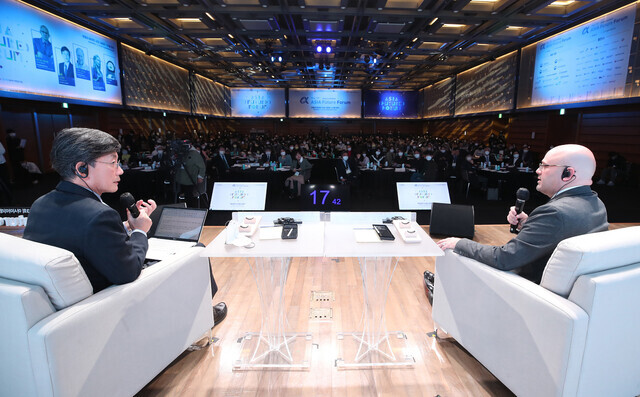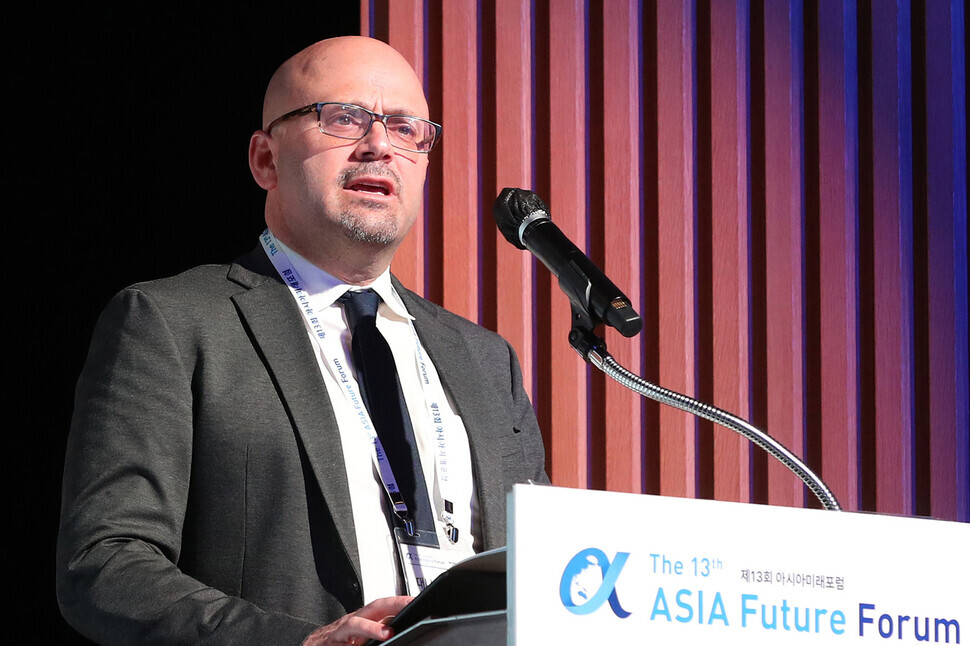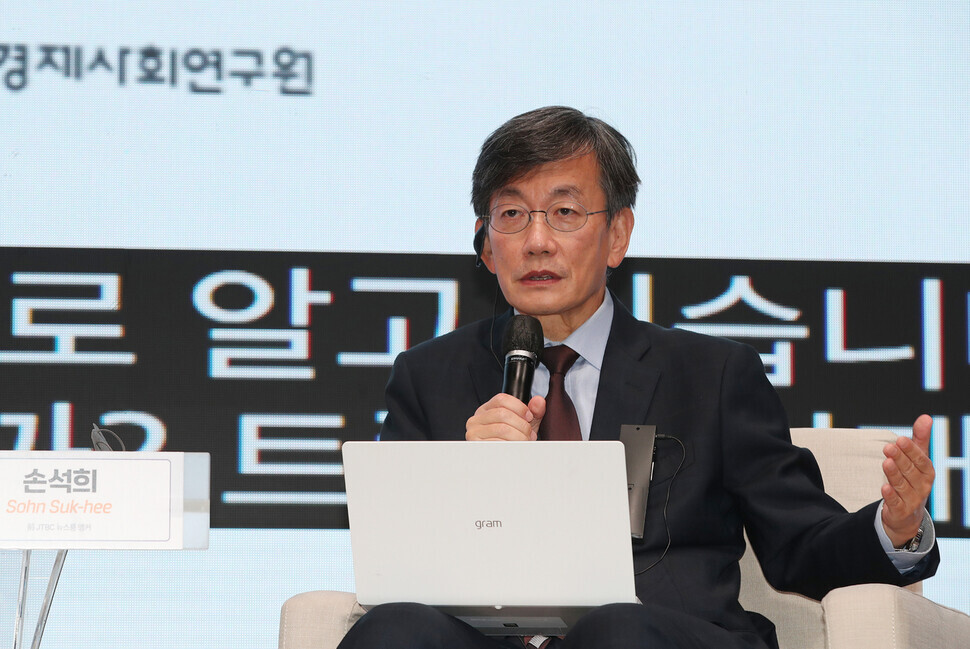hankyoreh
Links to other country sites 다른 나라 사이트 링크
Democracy-eroding zero-sum politics must be met with tolerance, understanding, argues scholar

The decline of political credibility is a global phenomenon irrespective of a country’s experience with democracy or its level of economic development. If this issue goes neglected, it could lead to a crisis of public trust and democracy. This is because the main responsibility to resolve social inequality, political polarization, and conflict lies with politics. So, how can we restore trust in politics?
Daniel Ziblatt, a professor of political science at Harvard University who studied the crisis of US democracy in the Trump era, advised that “we need to ease the zero-sum system of politics where the winner takes all.”
Ziblatt made the comments on Thursday at the 13th Asia Future Forum hosted by the Hankyoreh at the International Conference Hall at the Korea Chamber of Commerce and Industry in downtown Seoul.
The Harvard professor also stressed that political parties and politicians should exercise “mutual tolerance,” “understanding” and “restraint” to stop this winner-takes-all system.
“Democracy no longer collapses in a violent way. Instead, it collapses through democratic institutions and systems such as elected leaders, the parliament, and the Supreme Court,” Ziblatt said.
Paradoxically, the collapse of democracy begins at the polling station. The reason for this, Ziblatt argues, is political polarization.

The extreme act of demonizing political rivals damages democracy. “It is important to restore trust so that political parties can recognize their opponents as lawful competitors,” Ziblatt said.
He brought up the case of the European Union (EU) as a concrete way to restore trust in politics. The EU did not pursue grandiose ideals from the beginning, but started by resolving minor issues such as setting regulations on steel, coal and other natural resources and resolving disputes between companies and unions.
Through such cooperation, trust was built between countries, and the colossal project of European integration was able to be pushed forward. Even though political parties compete with each other, they can still build trust by finding and solving problems that they can cooperate on a regional basis and, like this, overcome political polarization.
“If democracy can function to correct extreme polarization, it is clearly the best political system,” Ziblatt emphasized.
Sohn Suk-hee, a former JTBC news anchor and moderator at the forum, pointed to “fandom politics,” where politicians only focus on their supporters, as the cause for polarization in Korean politics and conflicts among political camps.
“The ‘cathartic communication’ exhibited through the habitual behavior of [politicians] not trying to persuade the other side but instead only saying things that their supporters will like, is exacerbating polarization,” Sohn said.
Sohn also pointed out that the media also carries significant responsibility regarding political polarization. The media is not playing the role of keeping in check or monitoring politics and other areas from an objective, third-person perspective, but has instead become closely intertwined with certain political forces and political interests, which is deeply worsening the situation.
By pursuing this kind of profit-making model, the media feeds into the public’s confirmation bias and, through this process, can make factional conflicts even worse.
“This has become a world where anyone can become a reporter by simply starting a YouTube channel and where people can become a political commentator without any political experience,” Ziblatt said.

“Ironically, there is a phenomenon in which the more democratic society becomes, the more that anti-democratic forces also gain in strength. The media should act as a gatekeeper to prevent this from happening,” Ziblatt added.
An online earnings model and a press that can withstand profit-making pressure are essential to the survival of democracy.
But is it truly realistically possible to overcome political polarization through mutual tolerance and restraint?
“In this current situation of extreme political polarization, I am skeptical whether this problem can be resolved through tolerance and understanding,” Sohn said.
Meanwhile, Ziblatt said that, although this process will be very difficult, “protecting democracy is not done only through changes in the constitution and system.”
According to Ziblatt, “it is important to foster this kind of culture through education on democratic norms.”
By Lee Chun-jae, senior staff writer
Please direct questions or comments to [english@hani.co.kr]

Editorial・opinion
![[Column] Life on our Trisolaris [Column] Life on our Trisolaris](https://flexible.img.hani.co.kr/flexible/normal/500/300/imgdb/original/2024/0505/4817148682278544.jpg) [Column] Life on our Trisolaris
[Column] Life on our Trisolaris![[Editorial] Penalties for airing allegations against Korea’s first lady endanger free press [Editorial] Penalties for airing allegations against Korea’s first lady endanger free press](https://flexible.img.hani.co.kr/flexible/normal/500/300/imgdb/original/2024/0502/1817146398095106.jpg) [Editorial] Penalties for airing allegations against Korea’s first lady endanger free press
[Editorial] Penalties for airing allegations against Korea’s first lady endanger free press- [Editorial] Yoon must halt procurement of SM-3 interceptor missiles
- [Guest essay] Maybe Korea’s rapid population decline is an opportunity, not a crisis
- [Column] Can Yoon steer diplomacy with Russia, China back on track?
- [Column] Season 2 of special prosecutor probe may be coming to Korea soon
- [Column] Park Geun-hye déjà vu in Yoon Suk-yeol
- [Editorial] New weight of N. Korea’s nuclear threats makes dialogue all the more urgent
- [Guest essay] The real reason Korea’s new right wants to dub Rhee a founding father
- [Column] ‘Choson’: Is it time we start referring to N. Korea in its own terms?
Most viewed articles
- 1New sex-ed guidelines forbid teaching about homosexuality
- 2OECD upgrades Korea’s growth forecast from 2.2% to 2.6%
- 3[Column] Life on our Trisolaris
- 460% of young Koreans see no need to have kids after marriage
- 5Months and months of overdue wages are pushing migrant workers in Korea into debt
- 6[Guest essay] Maybe Korea’s rapid population decline is an opportunity, not a crisis
- 7Presidential office warns of veto in response to opposition passing special counsel probe act
- 8Is Japan about to snatch control of Line messenger from Korea’s Naver?
- 9Bills for Itaewon crush inquiry, special counsel probe into Marine’s death pass National Assembly
- 10Hybe-Ador dispute shines light on pervasive issues behind K-pop’s tidy facade